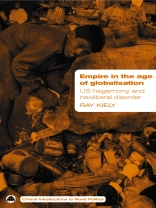This book examines the relationship between US hegemony and contemporary globalisation.
Many introductory textbooks on globalisation tend to be simplistic and conservative. This book moves things forward, providing a critical review of the globalisation debate. Kiely reveals the weaknesses of globalisation theory, and argues that we can only approach a proper understanding of the contemporary world order by linking globalisation to debates on capitalism, imperialism, neo-liberalism and universal human rights. He explores US hegemony in the light of these issues, showing how ‘liberal internationalism’ cannot be separated from capitalism, neo-liberalism and US empire-building.
Table des matières
Acknowledgements
1. Introduction
2. Globalisation theory or capitalist globalisation?
3. Globalisation and politics 1: state sovereignty, cosmopolitanism and imperialism
4. Globalisation and politics 2: international relations and the post-September 11th world
5. The global economy: US hegemony from Bretton Woods to neo-liberalism
6. Globalisation, culture and rights: liberal internationalism, imperialism and universalism
7. Conclusions: US imperialism, actually existing globalisation, and the question of alternatives
References
Index
A propos de l’auteur
Ray Kiely is Professor of International Politics at Queen Mary, University of London. He has authored a number of books, including Empire in the Age of Globalisation (Pluto, 2005).












